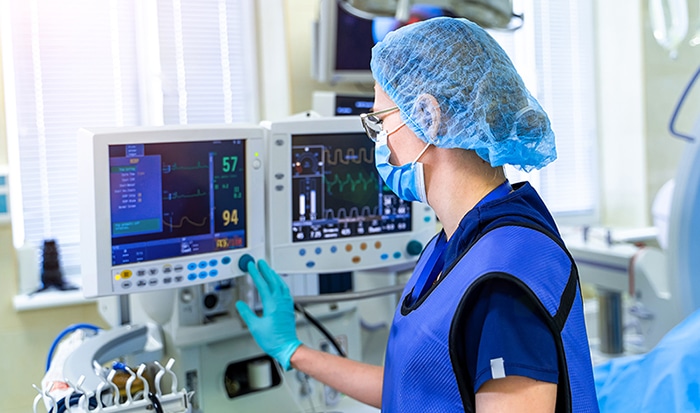As of early April 2020, over 1,000,000 people have been confirmed infected with the SARS-CoV-2 coronavirus, and governments are scrambling to contain its spread. The high R0 value (a measure of contagiousness) of SARS-CoV-2 means that those infected copiously spread the virus and develop complications suddenly. As a result, health care systems are overwhelmed, and effective delivery of medical care to all patients has become a challenge worldwide. Inadequate personal protective equipment (PPE), overcrowding, and difficulty protecting existing patients are key challenges the medical industry is grappling with. The most common measure implemented to contain the spread of the virus before it impacts health systems is social distancing, which in turn has resulted in shutdowns across many industries.
The Impact
Medical device manufacturers have not escaped the pandemic’s impact. Similar to pharmaceutical companies, medical device manufacturers rely heavily on healthcare facilities for their clinical trial data collection. Most medical device products must undergo clinical trials both pre- and post-market before manufacturers can obtain certificates for market approval.
While certain trials such as Investigator Initiated Studies (IIS) are necessary for the broad healthcare system to come to a consensus around efficacy of certain therapeutic options, other clinical trials are initiated by sponsors to investigate the safety and clinical performance of devices in order to satisfy regulatory requirements. For instance, in the EU, the Medical Device Regulation (MDR) requires manufacturers to conduct Post Market Clinical Follow-Up (PMCF) studies to demonstrate the continued safety and performance of their devices, as well as capture any emerging risks these may carry. However, the COVID-19 pandemic has delayed clinical trials and disrupted processes.
General Constraints
In an effort to relieve healthcare systems from all non-urgent medical requests during the COVID-19 pandemic, many clinics have been postponing non-critical surgeries and/or appointments as well as banning visitors. These restrictions include ambulatory visits, under which research studies typically fall. From a logistics perspective, Phase I units in many hospitals around the world—where extensive monitoring of volunteers during first-in-human studies generally take place—are being reserved for the monitoring of COVID-19 patients.

Clinical Investigations
Clinical investigations are mandatory for many medical devices that carry a certain level of risk, such as implantable devices. While planning a clinical study, manufacturers must navigate complex and costly processes such as those that require review by Ethics Committees and Competent Authorities. These authorities are currently concentrating their efforts on responding to the COVID-19 pandemic while their staff is working remotely, resulting in delays to initiation and subsequent execution of clinical trials.
For instance, delays in patient enrollment for non-COVID-19-related clinical studies are resulting in timeline shifts and budget adjustments for manufacturers. Overwhelmed clinical sites and healthcare professionals may have little to no interest in maintaining clinical routine and clinical trial schedules, and milestones may therefore be impacted. With large medical device manufacturers managing diverse product lines, these delays will likely impact entire pipelines and product launches unless these new medical devices are involved in the effort to contain COVID-19.
Investigator-Initiated-Studies
The medical device industry often relies on data from IIS, which are initiated by clinicians to investigate the clinical performance of certain therapeutics including medical devices, usually in the form of comparative studies. The clinical evidence derived from these IIS plays an essential role in the clinical evaluation reports (CER) that manufacturers are required to compile in order to obtain market approval in the EU. As a result of the widespread impacts of the COVID-19 pandemic, IIS are currently on hold or delayed with potential consequences to market access for all non-COVID-19-related medical devices. This could mean innovative, life-saving devices may not reach patients on time, or that legacy devices are unavailable for restock. Both of these scenarios carry significant risk of harm to patients worldwide, and could bring additional chaos to overwhelmed healthcare systems.
Post-Market Clinical Follow-up Activities
In addition to sponsor-driven clinical trials and IIS, PMCF projects are also likely being impacted by the COVID-19 pandemic. In the EU, PMCF activities are required to demonstrate conformity of subject devices with respect to their continued safety and performance parameters. PMCF studies are gaining momentum under the MDR as an increasing number of these follow-ups will be required to achieve compliance in the EU.
However, PMCF studies are not currently seen as attractive undertakings to clinicians and manufacturers for a variety of reasons. Many perceive post-market studies as bare regulatory necessities for products that often have a long market history, and these are therefore less appealing from a research perspective. Under this light and in the midst of a pandemic, investigators may risk neglecting these PMCF studies.
According to Henk Snyman, Medical Director (EU-MDR), Medical Affairs at Cook Medical, “Data collection for PMCF at sites will be severely impacted during the pandemic. Many clinicians have other priorities now and don’t want to discuss PMCF projects. The MDR extension is certainly welcome, but we still need to see the finer details.” However, if PMCF data collection is pushed out or unfulfilled, this could have harmful consequences such as loss of certificates for certain devices that are considered healthcare commodities.
What Are Some Things Manufacturers Can Do Right Now?
Implement Strategy to Mitigate COVID-19 Impact
Mitigating the effect of the COVID-19 pandemic will require a comprehensive evaluation of the study protocol, beginning with a risk assessment. Clinical trials that pose a benefit to the participant (such as “humanitarian use” designated devices in the US) pose a question of whether the trial can be safely suspended or discontinued entirely, and will need to be addressed according to the specific circumstances therein.
Second, for traditional, phased trials, the risk to participants should be assessed in terms of reporting obligations to sites, consequences of discontinuing the trial abruptly, etc. To facilitate study continuity, many manufacturers are implementing telemedicine solutions. This can range from mailing a patient user-friendly equipment (e.g. pulse oximeter, spirometer) for collecting data in the home, to in-person home nurse or technician visits supervised remotely by a clinician. As long as proper infection control measures are followed, the risk to the participant and study staff is significantly reduced when compared with entering a hospital or clinic.
Some medical devices can be configured to transmit data directly to your electronic data capture (EDC) solution, and can eliminate both the manual data entry as well as the need for a participant to visit a site. Speaking more broadly, principal investigators (PIs) should assess study endpoints pragmatically, and consult their ethics board to determine whether less important endpoints could be deferred if they require in-person visits or travel.
Decentralized technology will be a key component of the research community’s response to the pandemic. Over 85% of researchers reported in a recent survey that they expect moderate to severe effects on participant engagement in a recent survey, highlighting it as an area of significant concern. Thankfully, research technology has never been easier to use or simpler to implement. Electronic patient reported outcomes (ePRO) can reduce the travel burden on participants and study staff while continuing to capture data. Additionally, guidance issued by regulatory agencies in both the EU and US have enabled studies to rapidly transition from wet-signature informed consent to eConsent platforms.
For more information, see this article summarizing key considerations for mitigating COVID-19 impacts on research.
Prepare for Future Projects
Due to the COVID-19 pandemic, the European Commission recently adopted a proposal on April 3, 2020 to postpone the application date of the MDR for one year. “As the coronavirus crisis increases demands for certain vital medical devices, it is crucial to avoid any further difficulties or risks of potential shortages or delays in the availability of such devices caused by capacity limitations of authorities or conformity assessment bodies related to the implementation of the Medical Devices Regulation,” the Commission wrote in a statement.
With delays to the MDR and clinical trials, manufacturers should use this extra time to fill their clinical data gaps and catch up on planning activities such as their PMCF plans. To learn the steps needed to put together a PMCF plan that will pass Notified Body scrutiny, watch this webinar.
In addition, manufacturers should repurpose newly-freed schedules to peruse published scientific data that may suggest additional indications and possible fields of usage for their products. Stay in touch with the clinicians who support you (or may support you in the future) with research, development, or medical expertise.
Prepare also for the execution of future clinical studies by identifying areas for improvement in your data solutions and trial operations. When research resumes, having technology solutions and processes that better fit your needs will expedite the return to operational normalcy.
For instance, now is a good opportunity to improve how you capture data for medical device clinical trials. The ability to electronically perform clinical data collection and monitoring has a competitive advantage when compared to old-school, paper-based methods or legacy systems (Excel, SPSS, Access, etc) that not only require physical presence at sites but also create greater opportunities for errors.
Identifying the right electronic data capture (EDC) system that is best suited for your complex needs is crucial to success. When choosing your EDC, select the solution that will enable seamless data collection for you and your sites. This will minimize inaccuracies in the data while optimizing processes. Using the right EDC system can improve the overall quality of your clinical data and help your clinical research run more smoothly and efficiently.
Use Your Network to Think Outside the Box and Support Clinicians.
The COVID-19 pandemic is an opportunity to strengthen the partnership between manufacturers and clinicians. Take the time to speak with your products’ end users—especially with key opinion leaders—and ask what their greatest need is in their specific field and organization, hospital or private practice. Use your network to find solutions or satisfy these needs. Also find ways to help others who do not have the same knowledge or expertise as you or do not have the reach of your network. Click here to read how Castor enables research continuity during the COVID-19 pandemic.
Contact us to learn how we can support your medical device trials during this pandemic.





